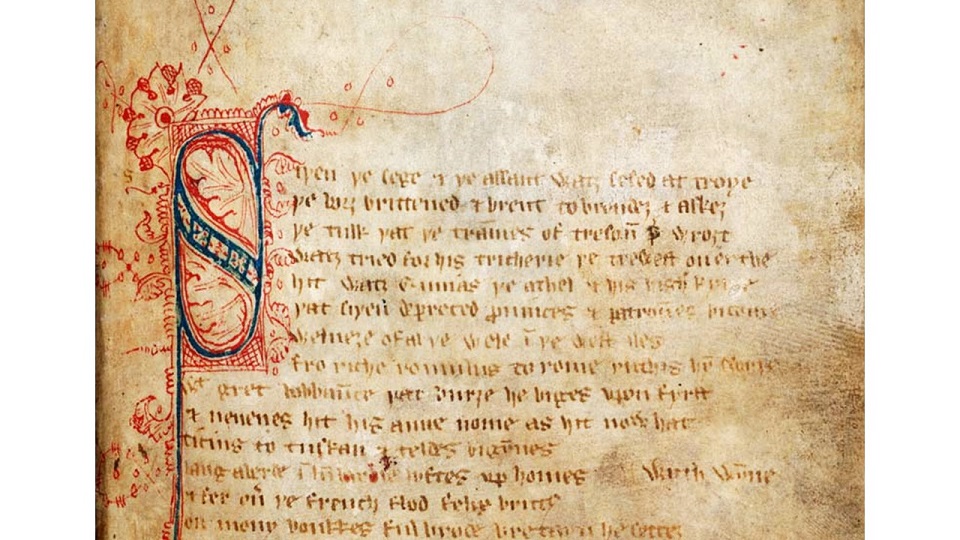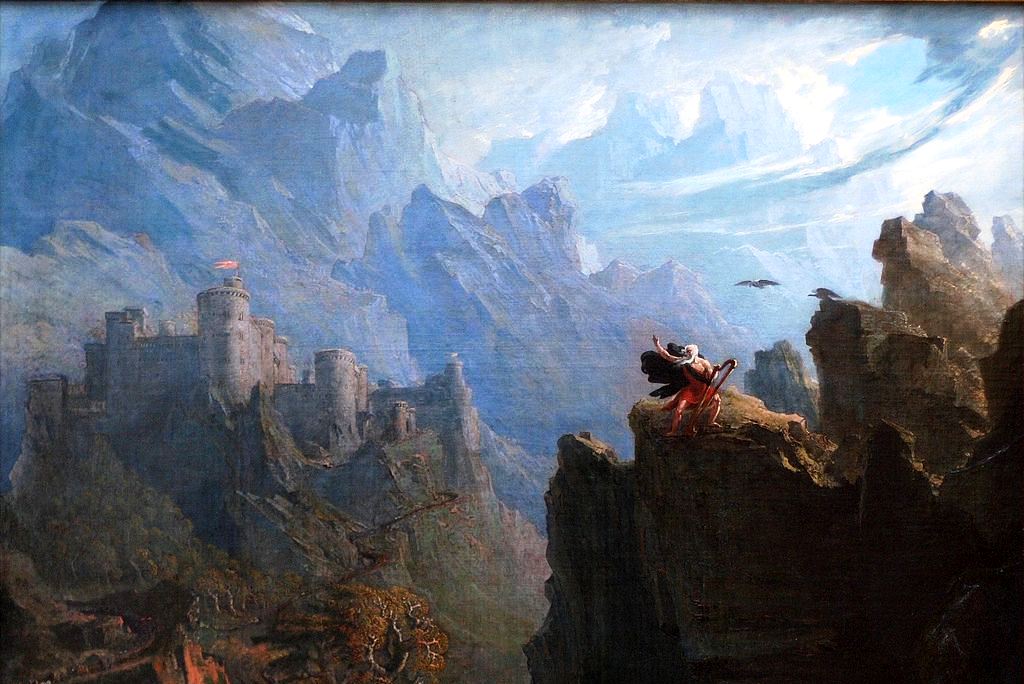Following the introduction below is a translated version of Sir Gawain and the Green Knight in PDF made free for download for teachers, students, and interested readers by the Society of Classical Poets. It can be purchased in book form on Amazon here. If you download, please consider making a donation to the Society of Classical Poets here.
.
Introduction
It’s the Christmas season at King Arthur’s court in Camelot, and all is merry during the holiday festivities… that is until a strange visitor—a half-giant knight all in green—shows up and issues a deadly challenge that will change the Knights of the Round Table forever.
This 14th century tale, written in both alliterative and rhyming poetry, is arguably the peak of all Arthurian literature. Though it is a self-contained, stand alone episode, it tells its tiny tale from start to finish with such ecstatic and ornate splendor and with such an eye to those true virtues that define the very essence of the noble knight that this relatively short work is elevated to a thing of monumental brilliance. This is why you will find an endless stream of translations and movie adaptions of it over the years.
In the broader scope of English literature and Western literature, Sir Gawain and the Green Knight represents an artistic fountainhead, a Springtime in which archetypes and themes are in full bloom—vibrant, pure, and untainted; so good as to define goodness itself. For instance, the vivid descriptions of Sir Gawain’s splendid armor, weapons, and horse stand in stark contrast to what we might consider the Autumn of literature: the old, mismatched, and decayed armor, weapons, and horse of the humorously senile knight Don Quixote, in Miguel Cervantes’ early 17th century work. If we continue further in the timeline and metaphor, we find the Winter of literature in the early 19th century with Sir Walter Scott’s Ivanhoe, in which the Saxon knight has no armor, horse, nor king, and must depend on a foreign Jewish banker and his daughter for all of them. Without Sir Gawain, the delightfulness of these classic characters, Don Quixote and Ivanhoe, simply would not exist.
Amidst today’s cynicism for tradition, Sir Gawain transcends social, cultural, or economic narratives, and succeeds in convincingly correlating great wealth and high social status, both of which he has, with traditional virtue. The story does this so well perhaps because it has such a clear handle on what traditional virtue is, matching five principles—generosity, fellowship, courtesy, chastity, and piety—to the five points on the knight’s symbol and putting those virtues to the test with an unflinching realism that makes for first-rate storytelling.
Who was the author of this great work? We do not know. However, we do know for certain that the phrase written in a different language at the end of the poem “Hony Soyt Qui Mal Pence” (“Shame on him who thinks evil of it”) is the motto of an order of knights, known as the Order of the Garter, who each wear a sash across his chest, a practice that this tale seems to allude to in its last moments. Thus, it is likely that Sir Gawain and the Green Knight was written for the founding of the Order in 1348 or in the order’s honor. The Order of the Garter still exists today and includes members of the British royal family, though their sash is usually blue, not green.
This version of Sir Gawain translates the original Middle English (which is of a particular Northern dialect distinct from the dialect of Chaucer’s Canterbury Tales) into readable plain English while staying true to each original line’s meaning, as well as keeping the style of alliterative lines and short metered and rhyming poems at the end of each paragraph.
To give you some idea of the difference between the Middle English of Sir Gawain and our English today, here is an example of the two:
Þis kyng lay at Camylot vpon Krystmasse
With mony luflych lorde, ledez of þe best
This king sat at Camelot at Christmas time
with many lovely lords, lieges most noble
As in the above, in many cases the difference isn’t too far to discern for yourself the original lines. If you are interested in reading more of the original Middle English, you can find at least several versions of it for free online viewing offered by Gutenberg.org and my alma mater, the University of Michigan.
Now, let the tale begin!
—Evan Mantyk, Translator & Editor
Download PDF here.
Download PDF with Two Pages of Text Per PDF Page (Ideal for Classroom Instruction) Here.
Sir Gawain_publication version_013023_online pdf for students.
.
.

















Evan, thank you for this. We are very fortunate, here in North Staffordshire, to be just a few miles from the supposed site of the Green Chapel. Lud’s Church is a huge cleft in the lonely, wild landscape of the Peak District. It was used as a secret religious site by the Lollards in the 15th C and is a most scary place. Time to dust off my copy for a re-read. Thanks for the reminder.
Are you near the “wilderness of Wyrral,” where poor Gawain wandered in much discomfort before coming to Lord Bercilak’s castle?
From the ridge above the “Green Chapel” the land drops away to the flat plain of Cheshire and the Wyrall or Wirral beyond, about 30 miles away. This land divides Liverpool from the Welsh Coast via the Mersey and Dee estuaries. Despite the many refineries and chemical plants, it is a special place. To stand at sunset and gaze over to Moel Famau and the Clwyd hills is quite magical.
Thanks Evan for a potential Christmas gift – printed off and bound with ribbon maybe.
Jeff, which version will you be dusting off?
Damian, my version is a paperback translation by Australian Keith Harrison from Oxford World’s Classics. The “Green Chapel” is a very special place in our neck of the woods. Best wishes.
It is possible to purchase your translation as a book? You did an excellent job.
Yes, here: https://www.amazon.com/Sir-Gawain-Green-Knight-Writer/dp/B09KDW9X7P/ref=sr_1_2?crid=1ZFF2TU4KIAWQ&keywords=sir+gawain+evan+mantyk&qid=1636161951&qsid=138-9110839-8421540&sprefix=sir+gawain+evan+mantyk%2Caps%2C253&sr=8-2&sres=B081C946ZJ%2CB09KDW9X7P%2C145634241X%2CB093K67LSW%2CB08HZC2NP4%2CB08YT3FGZK%2CB00U0HDM1M%2CB0973R6Q8K%2CB000CLTYCW%2CB097QG9JP6%2CB07DR9423C%2CB08BZSHMT2%2CB07J32SZT2%2CB07PJ9Y549%2CB07GCKZKX8%2CB08D1LYQD9%2CB07X1YLC2L%2CB00KDHS8PO%2CB07PK5DZK2%2CB07F3R6DHP&srpt=ABIS_BOOK